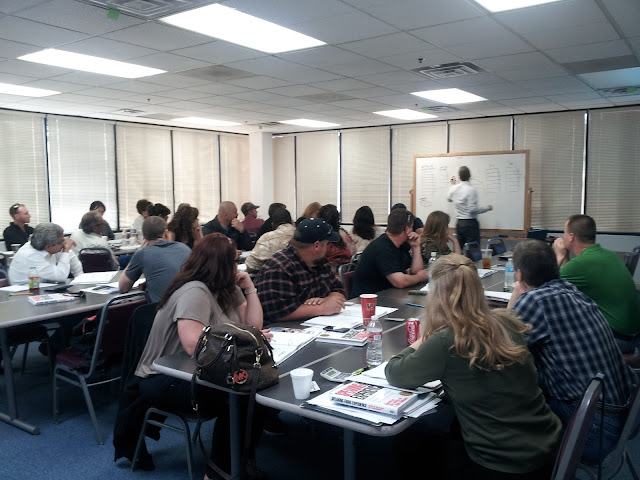Q: How was the front of your shop doing with sales and customer service before the How to Increase Your Profits seminar?
Mark Probst - Probst Auto Body
Deterich, IL:
Before I went to the seminar, our front office consisted of just me and my sister who had started with me part-time. She was doing some bookkeeping, paying bills, answering phones, and basically greeting customers.
I was doing everything else, including writing estimates. I thought the key to making the front work was simply treating everyone nice. I thought it was working for us. I didn’t think I was doing anything wrong.
Then, when I went to the seminar, I realized there were a lot of things that I wasn’t doing in the front. And I was losing sales left and right.
When I handled the estimates at the front counter, this is how it would go: a customer would walk in and ask for an estimate. I would write the estimate and give it to the customer and that was the end of my sale. The extent of my closing was that I would hope they would get their car fixed with us! I wasn’t aggressive with my closing. There wasn’t a whole lot of communication between me and the customers; I didn’t know what they really wanted. I would write the estimate and would hope they wanted me to fix it. That was my sale!
What I realized at the seminar is that we had no real system in place to handle customers and sell to customers at the front. I hadn’t even really trained my sister and just let her figure things out by herself. We handled stuff as it came at us and flew by the seat of our pants. Actually, we were constantly “putting out fires.”
I realized I wasn’t really being a salesperson at all. I needed to close the job and if it didn’t close, I needed to follow up with them the next day and really communicate with the customer.
Now, the front is doing awesome! We have a full system in place in the front to handle customers from the beginning of the estimate to the end. We’re closing anywhere from 80-90% of our estimates that we write! Going to the seminar really turned it around for my shop.
Steve Hixson - Art’s Automotive
Longview, WA:
In my case, before the seminar, we actually had a pretty fair sales group up front. We’ve got very large shops and we’ve been around a long time. However, at that point I couldn’t do better than I was doing. I was simply out of ideas on how to get to the next level.
The biggest thing I got from the seminar was learning about statistics. That was the first time I ever came across anything like that. I learned how to get all my weekly shop numbers down on paper and how to map them out over a period of time to really see the trends in the statistics for the shop. Then I actually had the ability to do something about the amount of sales I was getting in the front. I could come up with ideas and solutions on how to make those stats go up, and of course that’s what we’re all trying to do.
Six months after the seminar, it was like night and day. We actually were able to put in a plan to improve the statistics. Everyone in the front had their own task list to get done to achieve this. Because we now tracked the stats each week, we knew right away the things that were working and the things that weren’t. We kept what worked and got rid of what didn’t work!
Our close rate now is nearly 100%. Very rarely do we get an estimate that is not sold. After the seminar we knew how to improve the front and close more sales, schedule appointments, and get the workflow really going!
Dave Bloom - Pine Aire Truck Svc
Bay Shore, NY:
Before the How to Increase Your Profits seminar, I did most of the sales myself, and closing the sales wasn’t really a problem for me. But while I was up there making and closing those sales, I was losing other opportunities to move the business forward and expand. So, what the seminar made me see is that there are other people that are capable of closing sales the way that I was able to close sales. With the proper training, you can have another person do it which will allows you to be the owner, which makes the business move in the direction that’s more profitable for you. That’s the most important thing that I learned.
I found I was missing out on actually running my business. If you’re working in the business as a service writer, but you’re not running your business the way an owner should be running a business, you’re severely limiting the amount of growth that you’re capable of having in your shop.
The seminar showed me what holes I had in my business and where my inefficiencies were. I realized I wasn’t capable of being an owner and a service writer at the same time really well. Obviously, you can do customer service and service writing, but in order to make your company grow to where you want it to be, you have to hire the right person and properly train them to do that job up in the front for you.
And that’s where the Management Success! seminar comes in. These are the tools you can learn and use to expand your business like I did!
Management Success! How to Increase Your Profits Seminar






